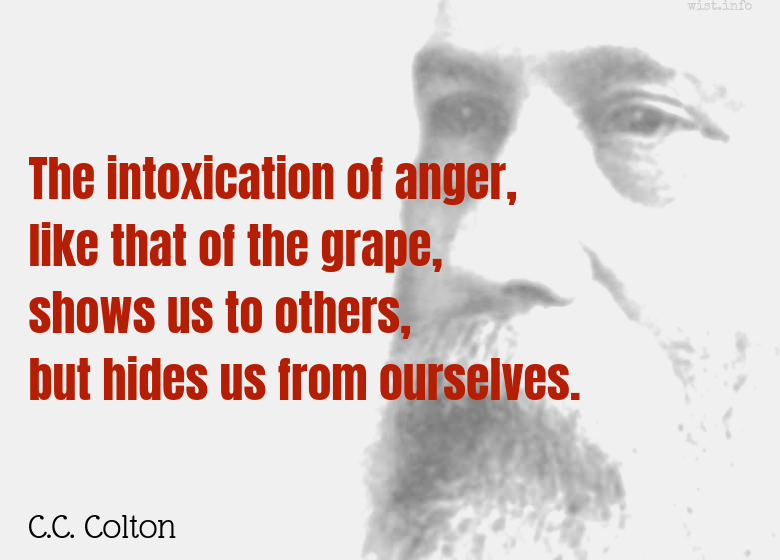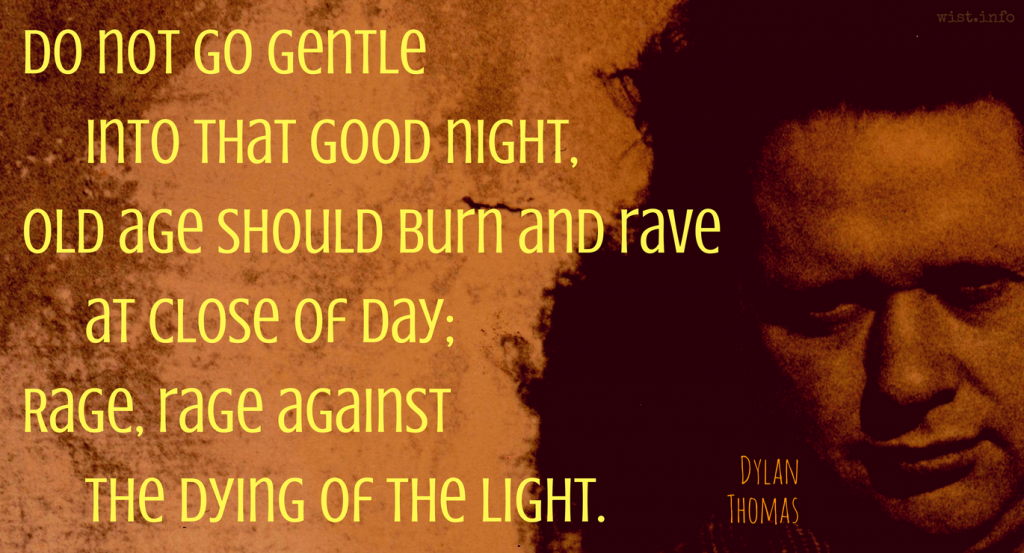The sun should not set upon our anger, neither should he rise upon our confidence. We should freely forgive, but forget rarely. I will not be revenged, and I owe to my enemy; but I will remember, and this I owe to myself.
Charles Caleb "C. C." Colton (1780-1832) English cleric, writer, aphorist
Lacon: Or, Many Things in Few Words, Vol. 1, § 35 (1820)
(Source)
Quotations about:
anger
Note not all quotations have been tagged, so Search may find additional quotes on this topic.
Whoever too precipitately yields
To anger, shall find sorrow at the last:
For wrath unbridled oft deceives mankind.[Οργή γάρ όστις ευθέως χαρίζεται ,
Κακώς τελευτά πλείστα γάρ σφάλλει βρoτούς .]Euripides (485?-406? BC) Greek tragic dramatist
Æolus [Αἴολος], frag. 31 (TGF) [tr. Wodhull (1809)]
(Source)
Nauck frag. 31, Barnes frag. 62, Musgrave frag.3. (Source (Greek)). Alternate translation:
Whoever yields to anger suffers a piteous end.
[Source]
A bitter-tongued parent cannot teach respect for facts. Truth for its own sake can be a deadly weapon in family relations. Truth without compassion can destroy love. Some parents try too hard to prove exactly how, where and why they have been right. This approach will bring bitterness and disappointment. When attitudes are hostile, facts are unconvincing.
Haim Ginott (1922-1973) Israeli-American school teacher, child psychologist, psychotherapist [b. Haim Ginzburg]
Between Parent and Teenager, ch. 2 “Rebellion and Response” (1969)
(Source)
Sometimes mis-cited to the earlier Between Parent and Child (1965).
Despair is anger with no place to go.
Mignon McLaughlin (1913-1983) American journalist and author
The Neurotic’s Notebook, ch. 8 (1963)
(Source)
What have you to say against laughing? Cannot one be very serious even whilst laughing? Dear Major, laughter keeps us more rational than vexation.
[Was haben Sie denn gegen das Lachen? Kann man denn auch nicht lachend sehr ernsthast sein? Lieber Major, das Lachen erhält uns vernünftiger als der Verdruss.]
Gotthold Lessing (1729-1781) German playwright, philosopher, dramaturg, writer
Minna von Barnhelm, Act 4, sc. 6 [Minna] (1763) [tr. Holroyd/Bell (1888)]
(Source)
(Source (German)). Alternate translation:
What have you to say against laughing? Can we not while laughing be very serious? Laughing keeps us more rational than sadness caused by vexation.
[Source (1884)]
Some think they see their own hope to advance
tied to their neighbor’s fall, and thus they long
to see him cast down from his eminence;
Some fear their power, preferment, honor, fame
will suffer by another’s rise, and thus,
irked by his good, desire his ruin and shame;
And some at the least injury catch fire
and are consumed by thoughts of vengeance; thus,
their neighbor’s harm becomes their chief desire.
[E’ chi, per esser suo vicin soppresso,
spera eccellenza, e sol per questo brama
ch’el sia di sua grandezza in basso messo;
è chi podere, grazia, onore e fama
teme di perder perch’altri sormonti,
onde s’attrista sì che ’l contrario ama;
ed è chi per ingiuria par ch’aonti,
sì che si fa de la vendetta ghiotto,
e tal convien che ’l male altrui impronti.]Dante Alighieri (1265-1321) Italian poet
The Divine Comedy [Divina Commedia], Book 2 “Purgatorio,” Canto 17, l. 115ff (17.115-123) (1314) [tr. Ciardi (1961)]
(Source)
Virgil explains to Dante how "bad" love -- love for self, love of another's harm -- can manifest as Pride, Envy, or Wrath toward others, the sins addressed in the first three tiers of Purgatory.
(Source (Italian)). Alternate translations:
Those first the taints, that to their Neighbours' fall
Trust for distinction on this Earthly Ball,
In talents, wealth, or fame, and feed their pride
By the sad sight of others' hopes depress'd,
And o'er their ruin lift a lofty crest,
With Venom from the fount of Good supply'd.
The next that feel this sullen Stygian flame,
Are those, that fear to lose their wealth or fame,
Or any gift, by bounteous Heav'n assign'd;
And long possess'd of Fortune's turning wheel,
In its ascent another name reveal,
That threats to leave them, and their hopes behind.
Another evil thus becomes their good,
And feeds their black desires with Demon food. --
The third are they, who, with the sense of wrong,
Burn inward, or with fell, vindictive Wrath
Pursue their brethren to the Cave of Death,
By love of Pelf, or fiend-like Frenzy stung.
[tr. Boyd (1802), st. 28-30]
There is who hopes (his neighbour’s worth deprest,)
Preeminence himself, and coverts hence
For his own greatness that another fall.
There is who so much fears the loss of power,
Fame, favour, glory (should his fellow mount
Above him), and so sickens at the thought,
He loves their opposite: and there is he,
Whom wrong or insult seems to gall and shame
That he doth thirst for vengeance, and such needs
Must doat on other’s evil.
[tr. Cary (1814)]
There is, in order neighbour to suppress,
Who would excel, himself, his sole desire
Grandeur, that sees another in the mire:
There is who power, grace, and honour, fame,
Still fears to lose, because the rest surpass,
Grows sad, and loves the counteracting cause:
There is who, for injurious affront,
Revenge desires, thirsts for another's pain,
And hence to ill of others must attain.
[tr. Bannerman (1850)]
There are, who, by abasement of their neighbour,
Hope to excel, and therefore only long
That from his greatness he may be cast down;
There are, who power, grace, honour, and renown
Fear they may lose because another rises,
Thence are so sad that the reverse they love;
And there are those whom injury seems to chafe,
So that it makes them greedy for revenge,
And such must needs shape out another's harm.
[tr. Longfellow (1867)]
There is who, through his neighbour being kept down, hopes for excellence, and only for this reason yearns that he may be from his greatness brought low. There is who fears to lose power, grace, honour, and fame, in case another mounts up, wherefore he grows so sad that he loves the contrary. And there is who through injury appears so to take shame that he becomes gluttonous of vengeance; and such an one it behoves that he put forward another's ill.
[tr. Butler (1885)]
There is, who through his neighbour's ruin, so
Hopeth pre-eminence, who hence doth call
That he from grandeur may be cast down low.
There is, who fears to lose power, grace, and all
Honour and fame, because that others rise.
Which grieves him so that he desires their fall.
There is, who seems so hurt by injuries,
That he on vengeance greedily doth brood;
And such a one another's ill must prize.
[tr. Minchin (1885)]
There is he who hopes to excel through the abasement of his neighbor, and only longs that from his greatness he may be brought low. There is he who fears loss of power, favor, honor, fame, because another rises; whereat he is so saddened that he loves the opposite. And there is he who seems so outraged by injury that it makes him gluttonous of vengeance, and such a one must needs coin evil for others.
[tr. Norton (1892)]
There is he who through his neighbour's abasement hopes to excel, and solely for this desires that he be cast down from his greatness;
there is he who fears to lose power, favour, honour and fame because another is exalted, wherefore he groweth sad so that he loves the contrary;
and there is he who seems to be so shamed through being wronged, that he becomes greedy of vengeance, and such must needs seek another's hurt.
[tr. Okey (1901)]
There is he that hopes to excel by the abasement of his neighbour and for that sole reason longs that from his greatness he may be brought low; there is he that fears to lose power, favour, honour, and fame because another surpasses, by which he is so aggrieved that he loves the contrary; and there is he that feels himself so disgraced by insult that he becomes greedy of vengeance, and such a one must needs contrive another's harm.
[tr. Sinclair (1939)]
There is, who through his neighbour's overthrow
Hopes to excel, and only for that cause
Longs that he may from greatness be brought low.
There is, who fears power, favour, fame to lose
Because another mounts; wherefore his lot
So irks, he loves the opposite to choose.
And there is, who through injury grows so hot
From shame, with greed of vengeance he is burned,
And so must needs another's ill promote.
[tr. Binyon (1943)]
Some hope their neighbour’s ruin may divert
His glory to themselves, and this sole hope
Prompts them to drag his greatness in the dirt;
Some, in their fear to lose fame, favour, scope,
And honour, should another rise to power,
Wishing the worst, sit glumly there and mope;
And some there are whose wrongs have turned them sour,
So that they thirst for vengeance, and this passion
Fits them to plot some mischief any hour.
[tr. Sayers (1955)]
There is he that hopes to excel by the abasement of his neighbor, and solely for this desires that he be cast down from greatness.
There is he that fears to lose power, favor, honor, and fame, because another is exalted, by which he is so saddened that he loves the contrary.
And there is he who seems so outraged by injury that he becomes greedy of vengeance, and such a one must needs contrive another's hurt.
[tr. Singleton (1973)]
There is the man who sees his own success
connect to his neighbor's downfall; thus,
he longs to see him fall from eminence.
Next, he who fears to lose honor and fame,
power and favor, if his neighbor rise:
vexed by this good, he wishes for the words.
Finally, he who, wronged, flares up in rage:
with his great passion for revenge, he thinks
only of how to harm his fellow man.
[tr. Musa (1981)]
There is the man who, through the suppression of his neighbour,
Hopes to excel, and for that reason only
Desires to see him cast down from his greatness:
There is the man who fears to lose power, favour,
Honour and glory because of another’s success,
And so grieves for it that he loves the opposite:
And there is the man who takes umbrage at injury
So that he becomes greedy for revenge
And such a man must seek to harm another.
[tr. Sisson (1981)]
There’s he who, through abasement of another,
hopes for supremacy; he only longs
to see his neighbor’s excellence cast down.
Then there is one who, when he is outdone,
fears his own loss of fame, power, honor, favor;
his sadness loves misfortune for his neighbor.
And there is he who, over injury
received, resentful, for revenge grows greedy
and, angrily, seeks out another’s harm.
[tr. Mandelbaum (1982)]
There are those who hope for supremacy through their neighbor’s being kept down, and only on this account desire that his greatness be brought low;
there are those who fear to lose power, favor, honor, or fame because another mounts higher, and thus are so aggrieved that they love the contrary;
and there are those who seem so outraged by injury that they become greedy for revenge, and thus they must ready harm for others.
[tr. Durling (2003)]
There are those who hope to excel through their neighbour’s downfall, and because of this alone want them toppled from their greatness. This is Pride.
There are those who fear to lose, power, influence, fame or honour because another is preferred, at which they are so saddened they desire the contrary. This is Envy.
And there are those who seem so ashamed because of injury, that they become eager for revenge, and so are forced to wish another’s harm. This is Wrath.
[tr. Kline (2002)]
Some hope, by keeping all their neighbours down, that they'll excel. They yearn for that alone -- to see them brought from high to low estate.
Then, some will fear that, if another mounts, they'll lose all honour, fame and grace and power, so, grieving at success, love what it’s not.
And some, it seems, when hurt, bear such a grudge that they crave only to exact revenge -- which means they seek to speed another’s harm.
[tr. Kirkpatrick (2007)]
There is the one, hoping to excel by bringing down
his neighbor, who, for that sole reason, longs
that from his greatness his neighbor be brought low.
There is the one who fears the loss of power, favor,
honor, fame -- should he be bettered by another.
This so aggrieves him that he wants to see him fall.
And there is the one who thinks himself offended
and hungers after vengeance,
and he must then contrive another's harm.
[tr. Hollander/Hollander (2007)]
First, there's the man who aspires to excellence
By pressing down his neighbor: only this yearning
Makes him strive to pull his neighbor to the ground.
Then there's the man with power, favor, and honor,
And so afraid of losing these when someone
Climbs above him, that he hates what once he loved.
And there's the man who, outraged at being insulted,
Lusts for the chance of taking revenge, and rushes
Into wicked plans for hurting others.
[tr. Raffel (2010)]
LEAR: I will do such things —
What they are, yet I know not, but they shall be
The terrors of the Earth!William Shakespeare (1564-1616) English dramatist and poet
King Lear, Act 2, sc. 4, l. 321ff (2.4.321-323) (1606)
(Source)
Blind greed! Brainless rage!
In our brief lives they drive us beyond sense
And leave us misery for a heritage
Throughout eternity![Oh cieca cupidigia e ira folle,
che sì ci sproni ne la vita corta,
e ne l’etterna poi sì mal c’immolle!]Dante Alighieri (1265-1321) Italian poet
The Divine Comedy [Divina Commedia], Book 1 “Inferno,” Canto 12, l. 49ff (12.49-51) (1309) [tr. James (2013)]
(Source)
On seeing Phlegethon, the river of boiling blood, in which those who violently injured others (through greed or wrath) are forced to stand for all eternity.
Some versions have this as something Virgil says; most make it an exclamation of Dante's.
(Source (Italian)). Alternate translations:
O foolish Rage, O blind desire,
That spurs you on, in the short life above,
To such dire Acts as to eternity
Will keep you in this wretched bath below!
[tr. Rogers (1782), l. 45ff]
O blind lust!
O foolish wrath! who so dost goad us on
In the brief life, and in the eternal then
Thus miserably o’erwhelm us.
[tr. Cary (1814)]
Oh blinded lust! oh anger void of sense!
To spur us o'er the shorter life so bold,
So fell to steep us in the life immense!
[tr. Dayman (1843)]
Oh blind cupidity [both wicked and foolish],
which so incites us in the short life, and then,
in the eternal, steeps us so bitterly!
[tr. Carlyle (1849)]
O blind cupidity! O foolish wrath!
Thorough this short life, that spurs them to the sleep,
Eternally in tide like this to steep.
[tr. Bannerman (1850), from Virgil]
Oh, blinded greediness! oh, foolish rage!
Which spur us so in the short world of life,
And then in death so drown us in despair!
[tr. Johnston (1867)]
O blind cupidity, O wrath insane,
That spurs us onward so in our short life,
And in the eternal then so badly steeps us!
[tr. Longfellow (1867)]
O blind covetousness! O foolish wrath! that dost so spur us in our short life, and afterward in the life eternal dost in such evil wise steep us!
[tr. Butler (1885)]
O blind cupidity, O foolish ire,
Which spurs us on so in our life's short day,
And soaks us till Eternity expire!
[tr. Minchin (1885)]
Oh blind cupidity, both guilty and mad, that so spurs us in the brief life, and then, in the eternal, steeps us so ill!
[tr. Norton (1892)]
O sightless greed! O foolish wrath! that dost in our short life, so goad us; and after, in the life that hath no end, dost sink us in such evil plight.
[tr. Sullivan (1893), from Virgil]
Oh, blind cupidity! Oh, senseless anger,
Which in the brief life spurs us on so hotly.
And in the eternal then so sadly dips us !
[tr. Griffith (1908)]
O blind covetousness and foolish anger, which in the brief life so goad us on and then, in the eternal, steep us in such misery!
[tr. Sinclair (1939)]
O blind greed and mad anger, all astray
That in the short life goad us onward so,
And in the eternal with such plungings pay!
[tr. Binyon (1943)]
O blind, O rash and wicked lust of spoil,
That drives our short life with so keen a goad
And steeps our life eternal in such broil!
[tr. Sayers (1949)]
Oh blind!
Oh ignorant, self-seeking cupidity
which spurs us so in the short mortal life
and steeps us so through all eternity!
[tr. Ciardi (1954)]
O blind cupidity and mad rage, which in the brief life so goad us on, and then, in the eternal, steep us so bitterly!
[tr. Singleton (1970)]
O blind cupidity and insane wrath,
spurring us on through our short life on earth
to steep us then forever in such misery!
[tr. Musa (1971)]
O blind cupidity and insane anger,
which goad us on so much in our short life,
then steep us in such grief eternally!
[tr. Mandelbaum (1980)]
O blind cupidity and senseless anger,
Which so goads us in our short life here
And, in the eternal life, drenches us miserably!
[tr. Sisson (1981)]
O blind desire
Of covetousness, O anger gone insane --
That goad us on through life, which is so brief,
to steep in eternal woe when life is done.
[tr. Pinsky (1994)]
Oh blind cupidity and mad rage, that so spur us in this short life, and then in the eternal one cook us so evilly!
[tr. Durling (1996)]
O blind desires, evil and foolish, which so goad us in our brief life, and then, in the eternal one, ruin us so bitterly!
[tr. Kline (2002)]
O blind cupidity, that brew of bile
and foolishness, which bubbles our brief lives,
before it steeps us in eternal gall!
[tr. Carson (2002)]
What blind cupidity, what crazy rage
impels us onwards in our little lives --
then dunks us in this stew to all eternity!
[tr. Kirkpatrick (2006)]
O blind covetousness, insensate wrath,
which in this brief life goad us on and then,
in the eternal, steep us in such misery!
[tr. Hollander/Hollander (2007)]
O greedy blindness and rage, insane and senseless,
Spurring us on in this, our so short life,
Then immolating us forever and ever!
[tr. Raffel (2010)]
Let not these things thy least concern engage;
For though thou fret, they will not mind thy rage.
Him only good and happy we may call
Who rightly useth what doth him befall.
[τοῖς πράγμασιν γὰρ οὐχὶ θυμοῦσθαι χρεών:
μέλει γὰρ αὐτοῖς οὐδέν: ἀλλ᾽ οὑντυγχάνων
τὰ πράγματ᾽ ὀρθῶς ἂν τιθῇ, πράσσει καλῶς]Euripides (485?-406? BC) Greek tragic dramatist
Bellerophon [Βελλεροφῶν], frag. 287 (TGF) (c. 430 BC) [Morgan (1718)]
(Source)
Quoted in Plutarch, "De Tranquilitate Animi [On the Contentedness of the Mind]," sec. 4. (467a). Nauck frag. 287, Barnes frag. 132, Musgrave frag. 24.
(Source (Greek)). Alternate translations:
Nor ought we to be angry at Events;
For they our anger heed not: but the man
Who best to each emergency adapts
His conduct, will assuredly act right.
[tr. Wodhull (1809)]
Events will take their course, it is no good
Our being angry at them; he is happiest
Who wisely turns them to the best account.
[tr. Shilleto (1888), frag. 298]
It does no good to rage at circumstance;
Events will take their course with no regard
For us. but he who makes the best of those
Events he lights upon will not fare ill.
[tr. Helmbold (1939)]
There is no point in getting angry at circumstances. They are uncaring, utterly unconcerned.
But a man who responds to them in the right way, he fares well.
[tr. Stevens (2012)]
One should not get angry with affairs, for they show no concern; but if a man handles affairs correctly as he encounters them, he fares well.
[tr. Collard, Hargreaves, Cropp (1995)]
LEAR: Come not between the dragon and his wrath.
William Shakespeare (1564-1616) English dramatist and poet
King Lear, Act 1, sc. 1, l. 136 (1.1.136) (1606)
(Source)
As, when in tumults rise th’ ignoble crowd,
Mad are their motions, and their tongues are loud;
And stones and brands in rattling volleys fly,
And all the rustic arms that fury can supply.[Ac veluti magno in populo cum saepe coorta est
seditio, saevitque animis ignobile volgus,
iamque faces et saxa volant — furor arma ministrat ….]Virgil (70-19 BC) Roman poet [b. Publius Vergilius Maro; also Vergil]
The Aeneid [Ænē̆is], Book 1, l. 148ff (1.148-150) (29-19 BC) [tr. Dryden (1697)]
(Source)
(Source (Latin)). Alternate translations:
As oft when a great people mutinie
Ignoble vulgar rage; stones, firebrands flye,
Furie finds arms.
[tr. Ogilby (1649)]
And as when a sedition has perchance arisen among a mighty multitude, and the minds of the ignoble vulgar rage; now firebrands, now stones fly; fury supplies them with arms.
[tr. Davidson/Buckley (1854)]
As when sedition oft has stirred
In some great town the vulgar herd,
And brands and stones already fly --
For rage has weapons always nigh ....
[tr. Conington (1866)]
As when
Sedition in a multitude has risen,
And the base mob is raging with fierce minds,
And stones and firebrands fly, and fury lends
Arms to the populace ...
[tr. Cranch (1872), l. 187ff]
Even as when oft in a throng of people strife hath risen, and the base multitude rage in their minds, and now brands and stones are flying; madness lends arms.
[tr. Mackail (1885)]
And, like as mid a people great full often will arise
Huge riot, and all the low-born herd to utter anger flies,
And sticks and stones are in the air, and fury arms doth find ....
[tr. Morris (1900)]
As when in mighty multitudes bursts out
Sedition, and the wrathful rabble rave;
Rage finds them arms; stones, firebrands fly about ....
[tr. Taylor (1907), st. 21, l. 181ff]
As when, with not unwonted tumult, roars
in some vast city a rebellious mob,
and base-born passions in its bosom burn,
till rocks and blazing torches fill the air
(rage never lacks for arms) ....
[tr. Williams (1910)]
And as, when oft-times in a great nation tumult has risen, the base rabble rage angrily, and now brands and stones fly, madness lending arms ....
[tr. Fairclough (1916)]
Sometimes, in a great nation, there are riots
With the rabble out of hand, and firebrands fly
And cobblestones; whatever they lay their hands on
Is a weapon for their fury.
[tr. Humphries (1951)]
Just as so often it happens, when a crowd collects, and violence
Brews up, and the mass mind boils nastily over, and the next thing
Firebrands and brickbats are flying (hysteria soon finds a missile) ....
[tr. Day-Lewis (1952)]
And just as, often, when a crowd or people
is rocked by a rebellion, and the rabble
rage in their minds, and firebrands and stones
fly fast -- for fury finds its weapons ....
[tr. Mandelbaum (1971), l. 209ff]
When rioting breaks out in a great city,
And the rampaging rabble goes so far
That stones fly, and incendiary brands --
For anger can supply that kind of weapon ....
[tr. Fitzgerald (1981)]
As when disorder arises among the people of a great city and the common mob riuns riot, wild passion finds weapons for men's hands and torches and rocks start flying ....
[tr. West (1990)]
As often, when rebellion breaks out in a great nation,
and the common rabble rage with passion, and soon stones
and fiery torches fly (frenzy supplying weapons) ....
[tr. Kline (2002)]
Riots will often break out in the crowded assembly
When the rabble are roused. Torches and stones
Are soon flying -- Fury always finds weapons.
[tr. Lombardo (2005)]
Just as, all too often,
some huge crowd is seized by a vast uprising,
the rabble runs amok, all slaves to passion,
rocks, firebrands flying. Rage finds them arms.
[tr. Fagles (2006)]
Just as riots often fester in great crowds when the common mob goes mad; rocks and firebrands fly, the weapons rage supplies.
[tr. Bartsch (2021)]
There are three things all wise men fear: the sea in storm, a night with no moon, and the anger of a gentle man.
Patrick Rothfuss (b. 1973) American author
The Name of the Wind, ch. 43 “The Flickering Way” (2007)
(Source)
It feels cooler to say, “I’m not woke,” than the truth, which is, “I’m terrified of what I don’t understand and I only know how to process that as anger because I can’t look inward.”
Sarah Silverman (b. 1970) American stand-up comedian, actress, writer
The Daily Show (15 Feb 2023)
(Source)
A physician would not cure his patients more effectually if he were angry with them for being ill, and the criminal law is not more effective when it is inspired by anger against the criminal. The criminal presents a problem, psychological, educational, sociological, and economic; this difficult problem is not best handled in a state of blind rage. All arguments for corporal punishment spring from anger, not from scientific understanding. As men become more scientific, such barbaric practices will be no longer tolerated.
Bertrand Russell (1872-1970) English mathematician and philosopher
“On corporal punishment,” New York American (1932-09-07)
(Source)
Violent zeal for truth has a hundred to one odds to be either petulancy, ambition, or pride.
VOLUMNIA: Anger’s my meat; I sup upon myself,
And so shall starve with feeding.William Shakespeare (1564-1616) English dramatist and poet
Coriolanus, Act 2, sc. 4, l. 68ff (2.4.68-69) (c. 1608)
(Source)
Anger is an inoculant. It gets your immune system working against bullshit. But anger can also make you sick, if you’re exposed to it for too long. That same caustic anger that can inspire you to action, to defend yourself, to make powerful and risky choices … can eat away at you. Consume your self, vulnerabilities, flesh, heart, future if you stay under the drip for too long. The anger itself can become your reason for living, and feeding it can be your only goal. In the end, you’ll feed yourself to it to keep the flame alive, along with everyone around you. Anger is selfish, like any flame. And so, like any flame, it must be shielded, contained, husbanded while it is useful and banked or extinguished when it is not. But flames don’t want to die, and they are crafty — an ember hidden here, a hot spot unexpectedly lurking over there. Sure, you can turn the feelings off, and I had done that before. But turning off the anger doesn’t lead to dealing with the problems that caused the anger.
Elizabeth Bear (b. 1971) American author [pseud. for Sarah Bear Elizabeth Wishnevsky]
Ancestral Night (2019)
(Source)
In despair
they blasphemed God, their parents, their time on earth,
the race of Adam, and the day and the hour
and the place and the seed and the womb that gave them birth.
But all together they drew to that grim shore
where all must come who lose the fear of God.
Weeping and cursing they come for evermore.[Bestemmiavano Dio e lor parenti,
l’umana spezie e ’l loco e ’l tempo e ’l seme
di lor semenza e di lor nascimenti.
Poi si ritrasser tutte quante insieme,
forte piangendo, a la riva malvagia
ch’attende ciascun uom che Dio non teme.]Dante Alighieri (1265-1321) Italian poet
The Divine Comedy [Divina Commedia], Book 1 “Inferno,” Canto 3, l. 103ff (3.103-108) (1309) [tr. Ciardi (1954), l. 100ff]
(Source)
The damned at Charon's boat, waiting to cross the Acheron. (Source (Italian)). Alternate translations:
God and their parents they alike blasphem'd,
Cursing all human kind, the time, the seed
From when they sprang, and of their birth the place.
They crouded then, with horrid yells and loud,
Close to the cursed shore of bliss devoid:
Where ev'ry Mortal waits who fears not God.
[tr. Rogers (1782), l. 87ff]
Loud they began to curse their natal star,
Their parent-clime, their lineage, and their God;
Then to the ferry took the downward road
With lamentable cries of loud despair.
Then o'er the fatal flood, in horror hung
Collected, stood the Heav'abandon'd throng.
[tr. Boyd (1802), st. 22-23]
God and their parents they blasphem'd,
The human kind, the place, the time, and seed
That did engender them and give them birth.
Then all together sorely wailing drew
To the curs'd strand, that every man must pass
Who fears not God.
[tr. Cary (1814)]
God they blasphemed, their parents and their kind,
The place, the time, the seed prolifical,
That embryo sowed them, and to life consigned.
Then wailing loud, their troop they gathered all,
And back recoiled them to the baleful verge,
Ordained to men from godliness who fall.
[tr. Dayman (1843)]
They blasphemed God and their parents; the human kind; the place, the time, and origin of their seed, and of their birth.
Then all of them together, sorely weeping, drew to the accursed shore, which awaits every man that fears not God.
[tr. Carlyle (1849)]
Blasphemed their God, their parents, human kind;
The time when, the hour, the natal earth,
The seed of their begetting, and their birth.
Then all withdrew, who there together were,
Loudly lamenting, to the wicked shore,
Awaiting those who feared not God before.
[tr. Bannerman (1850)]
God they blasphem'd, their parents they blasphem'd,
The human race, the place, the time, the seed
Of their conception and nativity.
Then by one impulse driv'n they onwards rush'd
With bitter weeping to th' accursèd shore;
The doom of all who have not God in fear.
[tr. Johnston (1867)]
God they blasphemed and their progenitors,
The human race, the place, the time, the seed
Of their engendering and of their birth!
Thereafter all together they drew back,
Bitterly weeping, to the accursed shore,
Which waiteth every man who fears not God.
[tr. Longfellow (1867)]
They fell to blaspheming God and their parents, the human kind, the place, the time, and the seed of their begetting and of their birth. Then they dragged them all together, wailing loud, to the baleful bank, which awaits every man that fears not God.
[tr. Butler (1885)]
They cursed at God and at their parentage,
The human race, the place, the time, the seed
Of their begetting, and their earliest age.
Then all of them together on proceed.
Wailing aloud, to the evil bank that stays
For every one of God who takes no heed.
[tr. Minchin (1885)]
They blasphemed God and their parents, the human race, the place, the time and the seed of their sowing and of their birth. Then, bitterly weeping, they drew back all of them together to the evil bank, that waits for every man who fears not God.
[tr. Norton (1892)]
They fell to blaspheming God and their parents, the human race, the place, the time, the seed of their sowing and of their births. Then in all their thronging crowds, the while they loudly wailed, they gathered them back together to the accursed shore, that awaiteth everyone that hath no fear of God.
[tr. Sullivan (1893)]
Blasphemed they God himself and their own parents.
The human race, the place, the time, the sowing
O' the seed they sprang from, and their own beginnings.
Then they retreated, one and all together,
Bitterly weeping, to the brink accursèd
Which for all men who fear not God is waiting.
[tr. Griffith (1908)]
They blasphemed God and their parents, the human kind, the place, the time, and the seed of their begetting and of their birth, then, weeping bitterly, they drew all together to the accursed shore which awaits every man that fears not God.
[tr. Sinclair (1939)]
They blasphemed God, blasphemed their mother's womb,
The human kind, the place, the time, the seed
Of their engendering, and their birth and doom;
Then weeping all together in their sad need
Betook themselves to the accursed shore
Which awaits each who of God takes no heed.
[tr. Binyon (1943)]
God they blaspheme, blaspheme their parents' bed,
The human race, the place, the time, the blood
The seed that got them, and the womb that bred;
Then, huddling hugger-mugger, down they scud,
Dismally wailing, to the accursed strand
Which waits for every man that fears not God.
[tr. Sayers (1949)]
They cursed God, their parents, the human race, the place, the time, the seed of their begetting and of their birth. Then, weeping loudly, all drew to the evil shore that awaits every man who fears not God.
[tr. Singleton (1970)]
They were cursing God, cursing their mother and father,
the human race, and the time, the place, the seed
of their beginning, and their day of birth.
Then all together, weeping bitterly,
they packed themselves along the wicked shore
that waits for everyman who fears not God.
[tr. Musa (1971)]
They execrated God and their own parents
and humankind, and then the place and time
of their conception's seed and of their birth.
Then they forgathered, huddled in one throng,
weeping aloud along that wretched shore
which waits for all who have no fear of God.
[tr. Mandelbaum (1980)]
Then they blasphemed God and cursed their parents,
The human race, the place and time, the seed,
The land that it was sown in, and their birth.
And then they gatehred, all of them together,
Weeping aloud, upon the evil shore
Which awaits every man who does not fear God.
[tr. Sisson (1981)]
... cursing the human race,
God and their parents. Teeth chattering in their skulls,
They called curses on the seed, the place, the hour
Of their own begetting and their birth. With wails
And tears they gaterhed on the evil shore
That waits for all who don't fear God.
[tr. Pinsky (1994)]
They cursed God and their parents, the human race and the place and the time and the seed of their sowing and of their birth.
Then all of them together, weeping loudly, drew near the evil shore that awaits each one who does not fear God.
[tr. Durling (1996)]
They blasphemed against God, and their parents, the human species, the place, time, and seed of their conception, and of their birth. Then, all together, weeping bitterly, they neared the cursed shore that waits for every one who has no fear of God.
[tr. Kline (2002)]
And they cursed God, and cursed the human race;
they cursed their parents=, and their kith and kin;
they cursed their birth; they cursed its time and place.
Weeping and gnashing their teeth they all drew in
to that accursèd shore, which is the ate
of everyone who brings his soul to ruin.
[tr. Carson (2002)]
They raged, blaspheming God and their own kin,
the human race, the place and time, the seed
from which they'd sprung, the day that they'd been born.
And then they came together all as one,
wailing aloud along the evil margin
that waits for all who have no fear of God.
[tr. Kirkpatrick (2006)]
They blasphemed God, their parents,
the human race, the place, the time, the seed
of their begetting and their birth.
Then weeping bitterly, they drew together
to the accursèd shore that waits
for every man who fears not God.
[tr. Hollander/Hollander (2007)]
They cursed at God, the human race, their parents,
The place where they'd been born, and the time, and the seed
That gave them life and brought about their birth.
Then they crowded, all of them loudly weeping,
Down to the cursed, ever-barren shore
That waits for men who live as if God were sleeping.
[tr. Raffel (2010)]
They cursed their parents, God, the human race,
The time, the temperature, their place of birth,
Their mother's father's brother's stupid face,
And everything of worth or nothing worth
That they could think of. Then they squeezed up tight
Together, sobbing, on the ragged edge
That waits for all who hold God in despite.
[tr. James (2013), l. 136ff]
Expectations are resentments waiting to happen.
Anne Lamott (b. 1954) American novelist and non-fiction writer
Crooked Little Heart, ch. 4 (1997)
(Source)
We think of forgiveness as a thing. An incident. A choice. But forgiveness is a process. A long, exhausting process. A series of choices that we have to make over, and over, and over again. Because the anger at having been wronged — the rage, the fury, the desire to lash out and cut back — doesn’t just vanish because you say to someone, “I forgive you.” Rather, forgiveness is an obligation you take on not to act punitively on your anger. To interrogate it when it arises, and accept that you have made the choice to be constructive rather than destructive. Not that you have made the choice never to be angry again.
Elizabeth Bear (b. 1971) American author [pseud. for Sarah Bear Elizabeth Wishnevsky]
Ancestral Night (2019)
(Source)
MENENIUS: His nature is too noble for the world.
He would not flatter Neptune for his trident
Or Jove for ‘s power to thunder. His heart’s his mouth;
What his breast forges, that his tongue must vent,
And, being angry, does forget that ever
He heard the name of death.William Shakespeare (1564-1616) English dramatist and poet
Coriolanus, Act 3, sc. 1, l. 326ff (3.1.326-331) (c. 1608)
(Source)
Speaking of the title character.
ENOBARBUS: When valor preys on reason,
It eats the sword it fights with.William Shakespeare (1564-1616) English dramatist and poet
Antony and Cleopatra, Act 3, sc. 13, ll. 240ff (3.13.240-241) (1607)
(Source)
My friends and I were all deathly afraid of our fathers, which was right and proper and even biblically ordained. Fathers were angry; it was their job.
The rich know anger helps the cost of living:
Hating’s more economical than giving.[Genus, Aucte, lucri divites habent iram:
Odisse, quam donare, vilius constat.]Martial (AD c.39-c.103) Spanish Roman poet, satirist, epigrammatist [Marcus Valerius Martialis]
Epigrams [Epigrammata], Book 12, epigram 13 (12.13) (AD 101) [tr. Michie (1972)]
(Source)
"To Auctus." Closely parallel to 3.37, to the point where some translations are cross-applied in error. The general interpretation, from Ker, is that "picking quarrels with clients saves you giving them presents."
(Source (Latin)). Alternate translations:
Anger's a kind of gain that rich men know:
It costs them less to hate than to bestow.
[tr. Fletcher (1656)]
Rich men, my friend, by anger know to thrive.
'Tis cheaper much to quarrel, than to give.
[tr. Hay (1755)]
From ire can gainmongers elicit ore.
Fell hate is frugal: love might lavish more.
[tr. Elphinston (1782), 12.68]
Ask you, last night, why Gripus ill behaved?
A well-timed quarrel is a dinner saved.
[tr. Halhead (1793)]
The rich, Auctus, make a species of gain out of anger.
It is cheaper to get into a passion than to give.
[tr. Bohn's Classical (1859)]
Rich men, Auctus, regard anger as a kind of profit;
to hate is cheaper than to give!
[tr. Ker (1919)]
The rich feign wrath -- a profitable plan;
'Tis cheaper far to hate than help a man.
[tr. Pott & Wright (1921)]
Rich men, Auctus, think of anger as a sort of moneymaking:
hating comes cheaper than giving.
[tr. Shackleton Bailey (1993)]
The rich pick fights and cause unpleasance:
Hate is cheaper than giving presents.
[tr. Ericsson (1995)]
The rich believe it pays to get irate --
to give is costlier, Auctus, than to hate.
[tr. McLean (2014)]
Wealthy friends, you’re quick to take offene.
It’s not good manners, but it saves expense.[Irasci tantum felices nostis amici.
Non belle facitis, sed iuvat hoc: facite.]Martial (AD c.39-c.103) Spanish Roman poet, satirist, epigrammatist [Marcus Valerius Martialis]
Epigrams [Epigrammata], Book 3, epigram 37 (3.37) (AD 87-88) [tr. McLean (2014)]
(Source)
The commentary by various authors indicates this is about wealthy patrons pretending to offense or other anger at their poorer clientele as an excuse for not being free with gifts. Closely parallel to 12.13.
(Source (Latin)). Alternate translations:
Rich friends 'gainst poor to anger still are prone:
It is not well, but profitably done.
[tr. May (1629); also as Hay (1755)]
My rich friends, you know nothing save how to put yourselves into a passion. It is not a nice thing for you to do, but it suits your purpose. Do it.
[tr. Bohn's Classical (1859)]
To be angry is all you know, you rich friends.
You do not act prettily, but it pays to do this.
[tr. Ker (1919)]
Rich friends, 'tis your fashion to get in a passion
With humble dependents, or feign it.
Though not very nice, 'tis a saving device,
Economy bids you retain it.
[tr. Pott & Wright (1921), "A Mean Trick"]
You well-off people are well versed only
in cursing out your inferiors:
Un For Giving bitching is quite enriching.
[tr. Bovie (1970)]
You weIl-off friends only know how to take umbrage. It's not a pretty way to behave, but it suits your book.
[tr. Shackleton Bailey (1993)]
Not easy, having money, blood so blue,
Lotta gifts expected for all your crew.
Kinda tacky to get angry and just tell 'em all go screw.
But the rich gotta do
What the rich gotta do.
[tr. Ericsson (1995)]
The rich feign wrath – a profitable plan;
’Tis cheaper far to hate than help a man.
[tr. Pott]
How explain why the conspicuously rich
are so easy to offend? Ask their accountant.
He probably won’t tell you but he’ll know.
[tr. Halsey]
The first thing to do when you are upset is to notice that you are. You begin by mastering your emotions and determining not to go any further. With this superior sort of caution you can put a quick end to your anger.
[El primer paso del apasionarse es advertir que se apasiona, que es entrar con señorío del afecto, tanteando la necesidad hasta tal punto de enojo, y no más. Con esta superior refleja entre y salga en una ira.]
Baltasar Gracián y Morales (1601-1658) Spanish Jesuit priest, writer, philosopher
The Art of Worldly Wisdom [Oráculo Manual y Arte de Prudencia], § 155 (1647) [tr. Maurer (1992)]
(Source)
(Source (Spanish)). Alternate translation:
The first step towards getting into a passion is to announce that you are in a passion. By this means you begin the conflict with command over your temper, for one has to regulate one's passion to the exact point that is necessary and no further. This is the art of arts in falling into and getting out of a rage.
[tr. Jacobs (1892)]
Anger is a passion, so it makes people feel alive and makes them feel they matter and are in charge of their lives. So people often need to renew their anger a long time after the cause of it has died, because it is a protection against helplessness and emptiness just like howling in the night. And it makes them feel less vulnerable for a little while.
Merle Shain (1935-1989) Canadian journalist and author
Hearts That We Broke Long Ago, ch. 5 (1983)
(Source)
It’s very important to decode your own messages, like saying “I feel angry” instead of kicking the cat, and people who learn to do this find they are misunderstood less often and, as a fringe benefit, are clawed by fewer cats.
Because society would rather we always wore a pretty face, women have been trained to cut off anger.
I am too weary to listen, too angry to hear.
Daniel Bell (1919-2011) American sociologist, writer, editor, academic
“First Love and Early Sorrows,” Partisan Review (Dec 1981)
(Source)
But oh! ye gracious Powers above,
Wrath and revenge from men and gods remove,
Far, far too dear to every mortal breast,
Sweet to the soul, as honey to the taste;
Gathering like vapours of a noxious kind
From fiery blood, and darkening all the mind.[Ὡς ἔρις ἔκ τε θεῶν ἔκ τ’ ἀνθρώπων ἀπόλοιτο
καὶ χόλος, ὅς τ’ ἐφέηκε πολύφρονά περ χαλεπῆναι,
ὅς τε πολὺ γλυκίων μέλιτος καταλειβομένοιο
ἀνδρῶν ἐν στήθεσσιν ἀέξεται ἠΰτε καπνός.]Homer (fl. 7th-8th C. BC) Greek author
The Iliad [Ἰλιάς], Book 18, l. 107ff (18.107) [Achilles] (c. 750 BC) [tr. Pope (1715-20)]
(Source)
Original Greek. Alternate translations:
How then too soon can hastiest death supplant
My fate-curst life? Her instrument to my indignity
Being that black fiend Contention; whom would to God might die
To Gods and men; and Anger too, that kindles tyranny
In men most wise, being much more sweet than liquid honey is
To men of pow’r to satiate their watchful enmities;
[tr. Chapman (1611), l. 98ff]
May fierce contention from among the Gods
Perish, and from among the human race,
With wrath, which sets the wisest hearts on fire;
Sweeter than dropping honey to the taste,
But in the bosom of mankind, a smoke!
[tr. Cowper (1791), l. 134ff]
Would that therefore contention might be extinguished from gods and men; and anger, which is wont to impel even the very wisest to be harsh; and which, much sweeter than distilling honey, like smoke, rises in the breasts of men.
[tr. Buckley (1860)]
Accurs’d of Gods and men be hateful strife
And anger, which to violence provokes
E’en temp’rate souls: though sweeter be its taste
Than dropping honey, in the heart of man
Swelling, like smoke.
[tr. Derby (1864)]
May strife perish utterly among gods and men, and wrath that stirreth even a wise man to be vexed, wrath that far sweeter than trickling honey waxeth like smoke in the breasts of men.
[tr. Leaf/Lang/Myers (1891)]
Therefore, perish strife both from among gods and men, and anger, wherein even a righteous man will harden his heart -- which rises up in the soul of a man like smoke, and the taste thereof is sweeter than drops of honey.
[tr. Butler (1898)]
So may strife perish from among gods and men, and anger that setteth a man on to grow wroth, how wise soever he be, and that sweeter far than trickling honey waxeth like smoke in the breasts of men.
[tr. Murray (1924)]
Why, I wish that strife would vanish away from among gods and mortals, and gall, which makes a man grow angry for all his great mind, that gall of anger that swarms like smoke inside of a man's heart and becomes a thing sweeter to him by far than the dripping of honey. [tr. Lattimore (1951)]
Ah, let strife and rancor perish from the lives of gods and men, with anger that envenoms even the wise and is far sweeter than slow-dripping honey, clouding the hearts of men like smoke.
[tr. Fitzgerald (1974)]
If only strife could die from the lives of gods and men
and anger that drives the sanest man to flare in outrage --
bitter gall, sweeter than dripping streams of honey,
that swarms in people's chests and blinds like smoke.
[tr. Fagles (1990), l. 126ff]
We may seem angry, but anger should be far from us; for in anger nothing right or judicious can be done.
[Sed tamen ira procul absit, cum qua nihil recte fieri nec considerate potest.]
Marcus Tullius Cicero (106-43 BC) Roman orator, statesman, philosopher
De Officiis [On Duties; On Moral Duty; The Offices], Book 1, ch. 38 (1.38) / sec. 136 (44 BC) [tr. Miller (1913)]
(Source)
(Source (Latin)). Alternate translations:
We must be sure, as was said, to avoid all anger; for whatsoever is guided by its influence and directions can never be done with any prudence or moderation.
[tr. Cockman (1699)]
But still, let anger be remote; for under its influence our conduct cannot be upright or deliberate.
[tr. McCartney (1798)]
But still, let all passion be avoided; for with that nothing can be done with rectitude, nothing with discretion.
[tr. Edmonds (1865)]
Anger itself we must put far away, for with it we can do nothing right or well-advised.
[tr. Gardiner (1899)]
All things considered, you should avoid anger; nothing good or courteous happens when men are angry.
[tr. Edinger (1974)]
But still anger ought be far from us, for nothing is able to be done rightly nor judiciously with anger.
[Source]
The difference between a conviction and a prejudice is that you can explain a conviction without getting angry.
(Other Authors and Sources)
Anonymous
No definitive source is found for this quotation. Frequently attributed to Gregory Benford, Deeper than the Darkness (1970), but it has shown up anonymously at least as early as 1951 as "filler" material in periodicals. Also sometimes attributed to Samuel Butler or Dorothy Sarnoff, but not with any citation.
There is a raging tiger inside every man whom God put on this earth. Every man worthy of the respect of his children spends his life building inside himself a cage to pen that tiger in.
Murray Kempton (1917-1997) American journalist.
America Comes of Middle Age: Columns, 1950-1962 (1963)
(Source)
Rage — Goddess, sing the rage of Peleus’ son Achilles,
murderous, doomed, that cost the Achaeans countless losses,
hurling down to the House of Death so many sturdy souls,
great fighters’ souls, but made their bodies carrion,
feasts for the dogs and birds.[Μῆνιν ἄειδε, θεά, Πηληϊάδεω Ἀχιλῆος
οὐλομένην, ἣ μυρί᾽ Ἀχαιοῖς ἄλγε᾽ ἔθηκε,
πολλὰς δ᾽ ἰφθίμους ψυχὰς Ἄϊδι προΐαψεν
ἡρώων, αὐτοὺς δὲ ἑλώρια τεῦχε κύνεσσιν
οἰωνοῖσί τε πᾶσι.]Homer (fl. 7th-8th C. BC) Greek author
The Iliad [Ἰλιάς], Book 1, l. 1ff (1.1-5) (c. 750 BC) [tr. Fagles (1990)]
Original Greek. Alternate translation:
The wrath of Peleus' son, the direful spring
Of all the Grecian woes, O Goddess, sing!
That wrath which hurled to Pluto's gloomy reign
The souls of mighty chiefs untimely slain,
Whose limbs, unburied on the naked shore,
Devouring dogs and hungry vultures tore ....
[tr. Pope (1715-20)]
Achilles sing, O Goddess! Peleus' son;
His wrath pernicious, who ten thousand woes
Caused to Achaia’s host, sent many a soul
Illustrious into Ades premature,
And Heroes gave (so stood the will of Jove)
To dogs and to all ravening fowls a prey.
[tr. Cowper (1791)]
Sing, O goddess, the destructive wrath of Achilles, son of Peleus, which brought countless woes upon the Greeks, and hurled many valiant souls of heroes down to Hades, and made themselves a prey to dogs and to all birds ....
[tr. Buckley (1860)]
Of Peleus' son, Achilles, sing, O Muse,
The vengeance, deep and deadly; wence to Greece
Unnumber'd ills arose; which many a soul
Of mighty warriors to the viewless shades
Untimely sent; they on the battle plain
Unburied lay, a prey to rav'ning dogs,
And carrion birds ....
[tr. Derby (1864)]
Sing, goddess, the wrath of Achilles Peleus' son, the ruinous wrath that brought on the Achaians woes innumerable, and hurled down into Hades many strong souls of heroes, and gave their bodies to be a prey to dogs and all winged fowls ....
[tr. Leaf/Lang/Myers (1891)]
Sing, O goddess, the rage of Achilles son of Peleus, that brought countless ills upon the Achaeans. Many a brave soul did it send hurrying down to Hades, and many a hero did it yield a prey to dogs and vultures ....
[tr. Butler (1898)]
The wrath sing, goddess, of Peleus' son, Achilles, that destructive wrath which brought countless woes upon the Achaeans, and sent forth to Hades many valiant souls of heroes, and made them themselves spoil for dogs and every bird ....
[tr. Murray (1924)]
Anger be now your song, immortal one,
Achilles' anger, doomed and ruinous,
that cause the Achaeans loss on bitter loss
and crowded brave souls into the undergloom,
leaving so many dead men -- carrion
for dogs and birds ....
[tr. Fitzgerald (1974)]
Sing now, goddess, the wrath of Achilles the scion of Peleus,
ruinous rage which brought the Achaians uncounted afflictions;
many the powerful souls it sent to the dwellings of Hades,
those of the heroes, and spoil for the dogs it made of their bodies,
plunder for all of the birds ....
[tr. Merrill (2007)]
An easygoing vice, I hold,
Is better than an angry virtue.[J’aime mieux un vice commode,
Qu’une fatigante vertu.]Molière (1622-1673) French playwright, actor [stage name for Jean-Baptiste Poquelin]
Amphitryon, Act 1, sc. 4, l. 681-2 [Mercury] (1666) [tr. Wilbur (2010)]
(Source)
Alt. trans.:
- "I prefer an accommodating vice / To an obstinate virtue."
- "I prefer a convenient vice, to a fatiguing virtune." [tr. Waller (1903)]
- Original French.
It is the wit,
The policy of sin, to hate those men
We have abus’d.William Davenant (1606-1668) English poet and playwright [a.k.a. William D'Avenant]
The Just Italian, Act 3, sc. 1 [Sciolto] (1630)
(Source)
Anger is like the blade of a butcher knife — very difficult to hold on to for long without harming yourself.
Patti LaBelle (b. 1944) American singer, author, actress [stage name for Patricia Louise Holt-Edwards]
Patti’s Pearls: Lessons in Living (2001) [with Laura Randolph Lancaster]
(Source)
To be a Negro in this country and to be relatively conscious is to be in a rage almost all the time.
James Baldwin (1924-1987) American novelist, playwright, activist
In “The Negro After Watts,” Time (27 Aug 1965)
(Source)
Article placed in the Congressional Record by Robert Byrd (24 Aug 1965).
A man can’t eat anger for breakfast and sleep with it at night and not suffer damage to his soul.
Garrison Keillor (b. 1942) American entertainer, author
“Could I Have Been Any More Inept?” Salon.com (26 Oct 1999)
(Source)
Anger blows out the lamp of the mind. In the examination of a great and important question, every one should be serene, slow-pulsed and calm.
Robert Green Ingersoll (1833-1899) American lawyer, agnostic, orator
“The Christian Religion,” Article 3, The North American Review (1881)
(Source)
Grab the broom of anger and drive off the beast of fear.
Zora Neale Hurston (1891-1960) American writer, folklorist, anthropologist
Dust Tracks on a Road, ch. 4 (1942)
(Source)
Anger as soon as fed is dead —
‘Tis starving makes it fat.
The intoxication of anger, like that of the grape, shows us to others, but hides us from ourselves; and we injure our own cause, in the opinion of the world, when we too passionately and eagerly defend it.
Charles Caleb "C. C." Colton (1780-1832) English cleric, writer, aphorist
Lacon, Vol. 1, #240 (1820)
(Source)
A man who cannot get angry is like a stream that cannot overflow, that is always turbid. Sometimes indignation is as good as a thunder-storm in summer, clearing and cooling the air.
Henry Ward Beecher (1813-1887) American clergyman and orator
Proverbs from Plymouth Pulpit, “Man” (1887)
(Source)
Bitterness is like cancer. It eats upon the host. But anger is like fire. It burns all clean.
Maya Angelou (1928-2014) American poet, memoirist, activist [b. Marguerite Ann Johnson]
In Mary Chamberlain, ed., Writing Lives: Conversations Between Women Writers (1988)
(Source)
Learn this from me. Holding anger is a poison. It eats you from inside. We think that hating is a weapon that attacks the person who harmed us. But hatred is a curved blade. And the harm we do, we do to ourselves.
Rage is caused by a conviction, almost comic in its optimistic origins (however tragic in its effects), that a given frustration has not been written into the contract of life.
Alain de Botton (b. 1969) Swiss-British author
The Consolations of Philosophy, ch. 3 “Consolation for Frustration” (2000)
(Source)
Do not go gentle into that good night,
Old age should burn and rave at close of day;
Rage, rage against the dying of the light.Dylan Thomas (1914-1953) Welsh poet and writer
“Do Not Go Gentle into That Good Night” (1947)
(Source)
First published in Botteghe Oscure (Nov 1951).
Even the best cooks were saucepan throwers when the soufflé collapsed.

















































